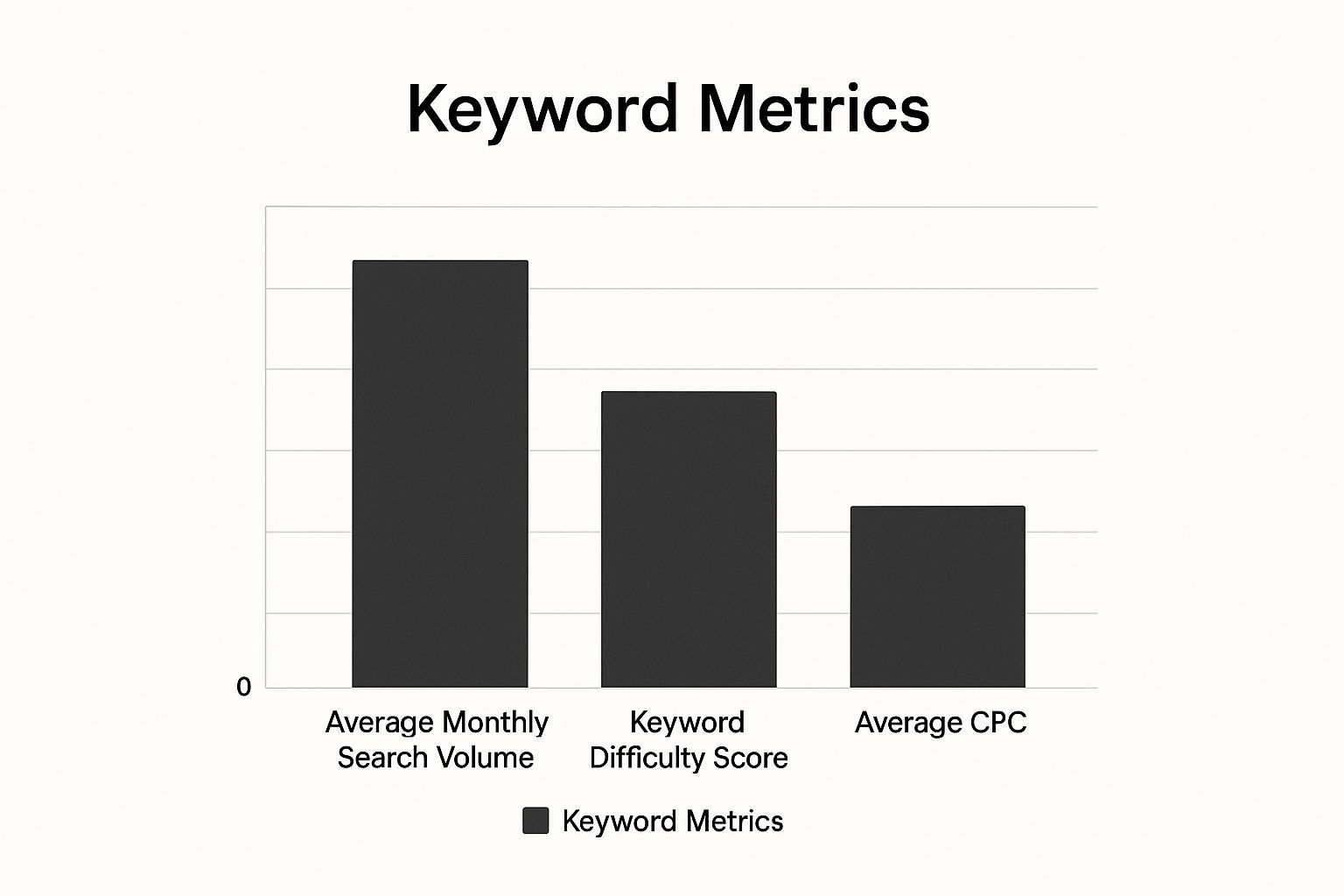How to Choose SEO Keywords: A UK Business Guide
- Mike Dodgson

- Jul 20
- 13 min read
Choosing the right keywords is about understanding people, not just algorithms. It's less about finding one single, perfect keyword and more about building a strategic foundation of topics that pull in the right kind of visitors—the ones genuinely interested in what you do.
Building Your Keyword Foundation
Learning how to pick keywords for SEO starts way before you open a research tool. It begins with a mental shift. Stop chasing individual, high-volume keywords and start building topic clusters that line up with your business goals. This approach gives all your future content a solid, strategic base to build upon.
The real aim here is to bridge the gap between what you sell and what your ideal customers are searching for. This means you need to get crystal clear on who your audience is and what problems they're trying to solve. What words do they use? What questions are they typing into Google? Answering these questions first makes your actual keyword research so much more potent.
Brainstorming Your Core Topics
Before getting lost in specifics, start by thinking in broad "buckets" or categories that are fundamental to your business. Don't worry about exact search phrases at this stage. Just jot down the main pillars of your expertise.
For example, a bakery in London wouldn't just put down 'cakes'. Their initial topic buckets might look like this:
Custom celebration cakes
Vegan wedding cakes
London corporate catering
Sourdough baking classes
Artisan bread delivery
See the difference? This simple exercise immediately focuses your energy on terms far more likely to attract a paying customer. 'Cakes' is incredibly broad and could mean anything. A search for 'vegan wedding cakes London' shows clear, specific intent from someone ready to buy.
Many small businesses, especially local ones like tradespeople, find that getting specific with their services and location is the secret sauce for attracting quality local leads. You can learn more about this in our guide to the SEO basics for tradespeople.
The most successful keyword strategies are built on a deep understanding of the customer. Before you analyse search volume or competition, you must first analyse the needs and language of the people you want to reach.
If you're new to all this, a complete guide on keyword research for beginners can offer a brilliant overview, taking you from these early brainstorming ideas right through to a finalised list.
Once you have your core topic buckets nailed down, you can start digging deeper into the specific phrases people might use to find answers within those topics. What questions are they asking? What's the problem they need solved? This customer-first mindset is the bedrock of any strategy that brings in visitors who aren't just browsing, but are actively looking for exactly what you offer.
Finding High-Potential Keyword Opportunities

Now that you've got your core topic buckets sorted, it's time for the fun part: digging into the specific search phrases your UK audience is typing into Google. We're moving from broad ideas to building a master list of potential keywords. The goal here is to cast a wide net and gather a rich collection of terms before we start the job of whittling them down.
This isn't just about plugging words into a tool. It’s about getting inside your customer's head and uncovering those golden opportunities your competitors might have overlooked.
Start with Your Seed Keywords
Think of your topic buckets as the starting point. They give you your initial "seed" keywords. For our London bakery example, a seed keyword might be 'artisan bread delivery'. This is where you bring in a good keyword research tool.
Feed it that seed term, and it will churn out a whole host of related ideas people are searching for. For instance, 'artisan bread delivery' could blossom into:
sourdough delivery London
next day bread delivery UK
organic bread subscription box
This simple action can instantly turn one idea into dozens of potential targets. At this stage, it’s all about quantity. Collect as many relevant phrases as you can find – we'll filter them later.
Analyse What's Working for Your Competitors
One of the smartest shortcuts to finding proven keywords is to peek at what your direct competitors are doing. Most decent SEO tools let you plug in a competitor's website and see exactly which keywords they rank for. You want to pay close attention to the terms landing them on the first or second page of Google; these are their money-makers.
But don't just blindly copy their list. The real magic is in finding the gaps. Are there relevant, high-intent keywords they're ranking for but have only produced thin or low-quality content? That’s your opening. You can swoop in by creating a genuinely superior resource and steal that spot.
A classic mistake is getting fixated on your big national rivals. Often, the best insights for UK businesses come from analysing smaller, niche, or local competitors who are already doing a great job of attracting your ideal customer.
Uncover Real-World Language in Forums
Keyword tools are brilliant, but they don't always reflect the natural, conversational language people use day-to-day. To find these hidden gems, you need to go where your audience hangs out. Online communities like Reddit (think r/UKPersonalFinance) or Mumsnet are goldmines for authentic customer language.
Look closely at the exact phrasing people use in post titles and comments. It's unlikely someone will formally search for "financial planning advice for freelancers UK." They're much more likely to ask something like, "How do I sort my pension as a sole trader in the UK?" That, right there, is a perfect long-tail keyword brimming with intent.
This approach helps you tune into how people genuinely think and speak about their problems, leading you to valuable phrases that are often far less competitive. All this raw data is what you’ll carry into the next stage, where we'll start refining this list using key metrics. To do that well, you’ll need to understand the numbers involved; our guide on what SEO metrics business owners need to know is a great place to start.
Analysing Keyword Search Volume and Competition
So, you’ve built your master list of keywords. That's a solid foundation, but right now, it’s just a raw collection of ideas. The real work begins now: sifting through this list to pinpoint the terms that give you a genuine chance of ranking and, more importantly, attracting the right kind of customers. This is where we separate the golden opportunities from the vanity metrics.
You'll be focusing on three main data points: monthly search volume, keyword difficulty, and cost per click (CPC). To get a proper handle on these, you really need to use comprehensive SEO platforms like SEMrush. These tools give you the hard data required to turn a sprawling list into a smart, strategic one.
The Truth About UK Search Volume
It’s completely natural to gravitate towards keywords with thousands of monthly searches. A term like 'wedding cakes' with a volume of 10,000 looks far more appealing than 'vegan wedding cakes London' at just 100 searches a month. Here’s a secret from the trenches: the bigger number is almost never the better choice, especially in the competitive UK market.
Massive search volume usually signals a very broad, fiercely contested keyword. These are the battlegrounds of huge national brands with eye-watering marketing budgets. For most small to medium-sized businesses, trying to compete here is a fast track to getting buried on page ten of Google’s results.
This image helps to visualise the relationship between common keyword metrics and where the real sweet spot is.

As you can see, high search volume almost always comes with high competition. The easier wins are found where the volume is lower.
The real magic happens with lower-volume, highly specific keywords. These terms attract visitors who are much further along in the buying process. They know what they want, and they're ready to convert.
Data on UK search habits backs this up completely. This table paints a clear picture of where the realistic opportunities are.
Keyword Volume vs. Realistic Opportunity in the UK
Keyword Category | Monthly Search Volume (UK) | Percentage of Total Keywords | Strategic Focus |
|---|---|---|---|
Head Terms | 10,000+ | 0.001% | Avoid unless you have a massive budget and authority. |
Mid-Tail | 101 - 1,000 | 1% | Competitive but achievable for established sites. |
Long-Tail | 11 - 100 | 3% | The sweet spot for targeted content and quick wins. |
Hyper-Long-Tail | 0 - 10 | 95% | Excellent for highly specific, purchase-intent queries. |
This breakdown shows why chasing massive search volumes is often a fool's errand. A staggering 95% of all keywords in the UK are searched for fewer than 10 times a month. The vast majority of search traffic is spread across an enormous number of unique, specific queries. Your best bet is to target these realistic, high-intent terms.
How To Gauge Keyword Difficulty
Keyword Difficulty (KD) is a score, usually out of 100, that SEO tools use to estimate how tough it will be to rank on Google's first page for a specific term. Think of it as a competitive-o-meter. A high KD score means you'll be up against websites with a lot of powerful backlinks and strong domain authority.
As you analyse your list, keep an eye out for keywords with lower KD scores. These are your easier wins – terms where you can create fantastic content and have a realistic shot at ranking fairly quickly.
Prioritising these helps build momentum and starts driving relevant traffic much sooner. It’s a fundamental part of influencing your search engine placement, a topic we explore in much more detail in our guide to SEO ranking factors for 2025.
Matching Keywords to Search Intent

So, you’ve done the hard work. You've sifted through the noise and now have a solid list of keywords with decent search volumes and competition levels you can tackle. What’s next? This is where the real strategy kicks in: figuring out the search intent behind every single phrase.
Simply put, you need to get inside the searcher's head. What are they really trying to do when they type that query into Google? Nailing this is the difference between attracting tyre-kickers and reeling in genuine, ready-to-buy customers. When your content perfectly matches what someone is looking for, you’re telling Google your page is the best result—a massive signal for higher rankings.
The Four Main Types of Search Intent
Every search query can be boiled down to one of four core motivations. Once you get a feel for these, you can start mapping your keywords to the different stages of your customer's journey, from them just realising they have a problem to pulling out their credit card.
Informational Intent: These people are in research mode. They have a question and they want an answer, fast. Think "how to make sourdough starter," "what is capital gains tax," or "symptoms of vitamin D deficiency."
Navigational Intent: The user knows exactly where they want to go and is just using Google as a shortcut. Searches like "YouTube" or "HSBC login" are classic examples. They aren't looking for your site unless your brand name is what they’re typing.
Commercial Intent: Now we're getting warmer. The searcher is weighing up their options and is close to making a decision. Their queries often include words like "best," "review," "comparison," or "alternatives." For example, "best accounting software for small business UK."
Transactional Intent: This is the money-maker. The user is ready to act now. These keywords are dripping with intent and often include terms like "buy," "discount," "deal," or specific product model numbers. Think "buy iPhone 15 Pro" or "Canva Pro discount."
Why You Should Prioritise High-Intent Keywords
For any business that needs to generate leads or sales, the gold is found in commercial and transactional keywords. Let's be honest, someone searching for "boots" is a complete mystery. Are they looking for pictures? The history of footwear? It's impossible to know.
But what about a search for ‘best waterproof hiking boots for Scottish highlands’? That tells a completely different story. This person has a specific problem (soggy feet while trekking in Scotland) and is actively hunting for the solution. This is a perfect example of a long-tail keyword in action.
Long-tail keywords are your secret weapon in SEO. Yes, their search volume is lower, but their conversion rates are through the roof because the intent is so incredibly specific. You stop chasing any old traffic and start attracting the right traffic.
This isn't just a hunch; the data backs it up completely. A staggering 70% of all online searches are for long-tail keywords. Better yet, research from 2023 showed that UK-based long-tail keywords (those between 10 and 15 words long) received 2.62 times more clicks than single-word terms. They also boasted click-through rates 1.7 times higher than their short-and-stumpy counterparts. You can dig into the complete dataset on long-tail keyword performance at MyCodelessWebsite.com.
As you go through your keyword list, start bucketing each term by its likely intent. This simple act of categorisation brings incredible clarity to your strategy. It instantly shows you which keywords belong on your high-stakes pages—like product and service pages—and which are better suited for blog posts. This sets you up perfectly for the final piece of the puzzle: creating a content plan that turns all this research into a powerful, results-driven publishing schedule.
Mapping Keywords to Your Content Plan
Alright, you've done the hard work of finding and refining your keywords. Now for the exciting part: turning that raw data into a real, workable content plan. This is where the theory stops and you start building something tangible.
Forget the old-school approach of creating a separate page for every single keyword variation. That just doesn’t work anymore. Today, it’s all about building topical authority.
The best way to do this is by organising your keywords into topic clusters. Think of it like a mind map. You have a central, broad topic (your 'pillar' page), with related, more specific ideas (your 'cluster' content) branching off it. This structure tells search engines like Google that you’re not just dabbling in a subject—you’re an expert.
From Keywords to Content Pieces
Let’s get practical. Lay out your keywords and start looking for natural groupings. It’s often more intuitive than you think.
For instance, if you're an accountant, you might have terms like "best accountant for contractors," "limited company tax advice," and "CIS tax returns." They all clearly fit under the umbrella of 'accounting for tradespeople'. That broader theme is a perfect candidate for a major pillar page.
The more niche, long-tail keywords then become your inspiration for blog posts, guides, or even FAQ sections. Each of these 'cluster' articles should link back to the main pillar page, creating a clean, logical network of content that’s a dream for both users and search engine crawlers to navigate.
Here’s how I typically assign them:
Pillar Pages: These are for your big, high-intent keywords like 'SEO services Newcastle'. These should be your core service or product pages—comprehensive, authoritative, and the best resource on the web for that topic.
Cluster Content: This is where your long-tail and question-based keywords shine. A query like 'how to improve local SEO for a shop' is the perfect starting point for a detailed blog post, a how-to guide, or a case study.
Building Your Content Calendar
Once your keywords are organised into these thematic groups, it's time to plot them on a content calendar. This doesn't need to be a fancy, expensive tool; a simple spreadsheet is all you need to get started.
Map out which articles you'll create and when. For each piece, assign one primary keyword and a couple of secondary, related terms. Having this schedule is crucial for staying consistent, which is half the battle in SEO. For more ideas on structuring this, check out our guide on SEO content planning for growing businesses.
And if you want to speed things up, modern marketing AI tools can be a massive help in both organising your ideas and drafting the content itself.
In UK SEO, the game has changed. It's no longer about obsessive keyword matching. It’s about proving you have deep, expert-level knowledge on a topic. This clustering method is how you do it.
This approach is particularly powerful here in the UK. A staggering 94.74% of keywords get searched 10 times or fewer per month. That single statistic tells you everything you need to know. It means most UK businesses should stop chasing a few high-volume terms and focus on building authority across dozens of related, niche queries.
With organic results driving 94% of all clicks in the UK, building this kind of long-term topical authority is your surest path to sustainable growth.
Common Keyword Research Questions

As you start getting your hands dirty with keyword research, you'll run into a few recurring questions. It happens to everyone. Let's walk through some of the most common ones I hear from clients, so you can move forward with a clear, effective plan.
How Many Keywords Should I Target on a Single Page?
This is probably the question I get asked most. The simple answer is to focus on one primary keyword per page. Think of this as your page's North Star – the main search query you want to rank for.
But it doesn't stop there. You should also weave in a small handful of 3-5 secondary keywords. These aren't random phrases; they're closely related variations or subtopics that add depth and context. This approach helps search engines see your page as a comprehensive resource on the subject, and it naturally creates a better, more informative experience for your readers.
The goal is to build a complete resource on a single topic, not just cram a page with keywords. This 'topic cluster' method is what really works today.
How Often Should I Conduct Keyword Research?
SEO isn't a set-it-and-forget-it job. Search trends evolve, your competitors adapt, and new opportunities pop up all the time. Your keyword research needs to be an ongoing process.
Here’s a rhythm that works well in practice:
A Major Annual Review: At least once a year, take a step back and do a thorough check of your entire keyword strategy. Re-evaluate your core topics and see if your main commercial keywords are still the right ones for your business goals.
Quarterly Check-ins: Every three months or so, do a lighter review. This is your chance to spot emerging trends, see what your competitors are ranking for now, and find fresh ideas for your content calendar. It keeps your strategy sharp and relevant.
Should I Target Keywords with Zero Search Volume?
It might sound counterintuitive, but yes, sometimes you absolutely should. The search volume data you get from tools isn't gospel; it often misses or underestimates very niche, long-tail queries.
If you find a keyword that shows zero search volume but you know from your industry experience that it's a perfect match for your audience and signals a clear need for your product or service, it can be gold. Targeting these hyper-specific phrases is a brilliant way to attract highly qualified visitors before your competitors even know they exist.
What Is the Difference Between a Keyword and a Topic?
Getting this right is fundamental. Think of it like this: a topic is the broad subject matter you want to be an authority on. For a law firm, it might be 'commercial property law'; for a garden centre, it could be 'sustainable gardening'.
A keyword is the specific phrase someone types into Google. For instance, 'commercial lease break clause advice UK' or 'how to make organic compost at home'.
A winning SEO strategy always starts with identifying your core topics first. From there, you can dig in and find all the different keywords your ideal customers are using to explore those subjects.
Ready to turn all this research into a content strategy that delivers real business growth? At Digital Sprout, we specialise in creating SEO strategies that attract and convert your ideal customers. Learn more about our full range of SEO services and let's start ranking for the terms that truly matter.
.jpg)